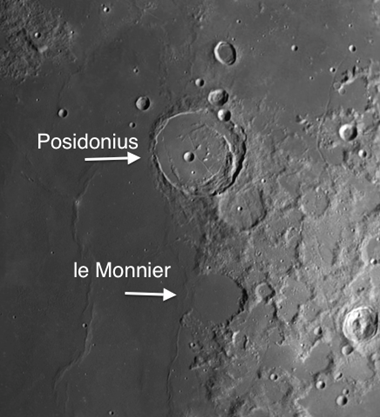 The week of March 7-13 takes us from Day 5 to Day 11. This week we will highlight moon craters Posidonius and le Monnier, viewable on Tuesday evening.
The week of March 7-13 takes us from Day 5 to Day 11. This week we will highlight moon craters Posidonius and le Monnier, viewable on Tuesday evening.
 Posidonius/le Monnier: [NE/F-G13; L=30°E] There are only two craters of any consequence on Mare Serenitatis: Posidonius (named after a Greek astronomer/philosopher, not the god of the sea) and le Monnier. They are both textbook examples of subsidence, but Posidonius is, in addition, a floor-fractured crater (FFC). It has internal craterlets and a complex system of rilles, so you get more bang for your buck. (For its near twin, see Gassendi–Day 10.) Its substantial ramparts, which have been inundated by lava flows on the western side, are evident to the east and south of the crater’s rim. If you can make out the north-south rille on the western side of the basin floor, does it appear to curve around to the east just inside the rim (as it does in Rükl’s Atlas), or does it cleave its way through the mountains (as it appears to do in some photographs)? How does it strike you? Spend some time with Posidonius, it has a lot to teach.
Posidonius/le Monnier: [NE/F-G13; L=30°E] There are only two craters of any consequence on Mare Serenitatis: Posidonius (named after a Greek astronomer/philosopher, not the god of the sea) and le Monnier. They are both textbook examples of subsidence, but Posidonius is, in addition, a floor-fractured crater (FFC). It has internal craterlets and a complex system of rilles, so you get more bang for your buck. (For its near twin, see Gassendi–Day 10.) Its substantial ramparts, which have been inundated by lava flows on the western side, are evident to the east and south of the crater’s rim. If you can make out the north-south rille on the western side of the basin floor, does it appear to curve around to the east just inside the rim (as it does in Rükl’s Atlas), or does it cleave its way through the mountains (as it appears to do in some photographs)? How does it strike you? Spend some time with Posidonius, it has a lot to teach.
======================
It is highly recommended that you get a copy of Sky and Telescope’s Field Map of the Moon, the very finest Moon map available for use at the telescope. It is available for $10.95 at www.skyandtelescope.com and on Amazon. All features mentioned in this blog will be keyed to the grid on the Field Map and will look like this: Plato: [NW/D9]
Credits:
Courtesy of Gray Photography of Corpus Christi, Texas
Lunar photos: NASA / USGS / BMDO / LROC / ASU / DLR / LOLA / Moon Globe. Used by permission
- Rupes Cauchy: A Best Known Fault on the Moon - July 22, 2024
- Moon Crater Schickard – Crater Floor has Stripes - July 15, 2024
- Moon Craters Langrenus and Vandelinus - July 8, 2024